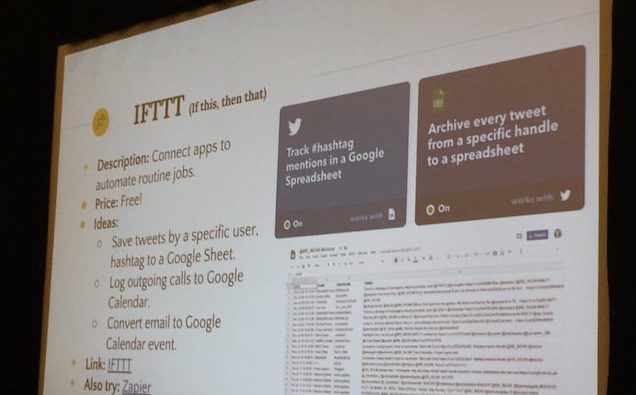The annual Investigative Reporters and Editors conference, which wrapped up Sunday, is always jam-packed with tips, tools and advice for both novice and veteran investigators. But if, like me, you weren’t able to make it this year, there’s plenty of wisdom to be soaked up simply by scanning the #IRE18 feed on Twitter. Like this:
This app- If This, then That – will move items into a Google doc. Like all tweets with a certain hashtag. #ire18 @sarhutch @blatchfordtr pic.twitter.com/EMzobRBTMa
— Daniel Connolly 〽️ (@DanielConnolly) June 17, 2018
It’s well worth reading through the 2,000-plus tweets posted by reporters eager to share what they’d gleaned from some of the best in the business. But of course that takes time, so I’ve pulled out some pearls to ponder and resources to explore.
It’s inspiring to see the camaraderie and generosity of journalists trying to help their colleagues up their game and find and tell the best stories they can. They’ve offered tips on tracking this administration’s daily assaults on science, human rights and democracy, and encouraged reporters to figure out how those abuses are playing out in their communities and how to give voices to those struggling to be heard.
The sessions covered an incredible diversity of topics, from tips on reporting techniques (software for data reporting, investigative interviewing tips, data visualization programs) to advice on covering specific issues (guns, healthcare, crime labs) and much more. I’ve highlighted below some tips and resources to introduce science journalists to the mindset and tools investigative reporters learn. But I encourage you to scroll through #IRE18. You might find just the tool you’ve been looking for to add depth to your reporting.
“You should not be doing investigations on issues. You should be doing investigations on people swept up in the issues.” –@DwayneBrayESPN #IRE18
— Megan Raposa (@mlraposa) June 15, 2018
https://twitter.com/BetsBarnes/status/1007632139033153536?ref_src=twsrc%5Etfw
When you start a project, open 3 files, 1) chronology file – organize events by time. 2) Notes – one centralized searchable repository for photos. links. 3) questions file – list of questions you need answered. T Christian Miller #ire18
— Kim Clark (@kclarkcollege) June 15, 2018
https://twitter.com/maryannbatlle/status/1007652498696540160
If you have the time, have an off-the-record get-to-know-you conversation with sources. No notebooks. No recorders. Explain your process, schedule, etc., says T. Christian Miller #ire18
— Kim Clark (@kclarkcollege) June 15, 2018
Recovering from an electrifying weekend at #IRE18? Or missed the conference? There's plenty of tips & tools to explore & put to good use in your investigations, find them in this tipsheets & links page by @IRE_NICAR https://t.co/f6kACFCZjt pic.twitter.com/CpI6VeAl5C
— Global Investigative Journalism Network (@gijn) June 18, 2018
Of course, virtual tips from the conference are great, but there’s no substitute for being there. Look who showed up this year.
https://twitter.com/HunterMw/status/1007647790485426177
